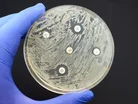Vaccine Breakthrough on Antibiotics Resistant Diseases

Vaccine researchers are exploring a new approach to finding a solution to the problem of antibiotic-resistant bacteria.
The experimental vaccine provided mice with high levels of immunity from lethal levels of MRSA bacteria staphylococcus aureus. The researchers’ work was detailed in the peer-reviewed scientific journal Nature Communications.
The researchers were studying a particular type of carbohydrate molecule called PNAG, and were able to attach two versions of this to a virus that infects s. aureus bacteria. Importantly, the PNAG-virus combination had minimal negative impact on healthy bacteria living in the mice's intestines.
The researchers noted that because PNAG is present in many different types of bacteria, it could be an attractive target for developing a vaccine.
Such a vaccine is desperately needed. The overuse of antibiotics is behind the rise of so-called superbugs, like MRSA, that are resistant to most commonly available treatments. Antimicrobial resistance has reached such a pitch that it now poses a major global threat to people, public health, society and economies worldwide.
As antibiotics become less effective, vaccines are an increasingly important tool to help reduce the spread of antibiotic resistance yet they are under-used for this purpose.
Big pharmas working on vaccines to target bacteria
However, several pharmaceutical companies are working on developing new vaccines to help combat antimicrobial resistance (AMR):
- Pfizer is developing vaccines targeting bacterial pathogens like staphylococcus aureus (skin and soft tissue infections), clostridium difficile (diarrhoea and colitis) and enterococcus faecium (urinary tract infections, intra-abdominal infections).
- GlaxoSmithKline is working on a vaccine candidate for Klebsiella pneumoniae (pneumonia).
- Merck is developing vaccines for staphylococcus aureus and Pseudomonas aeruginosa (hospital-acquired infections).
- Valneva is a biotechnology company developing a vaccine candidate for clostridium difficile
- Sanofi Pasteur, the vaccines division of French pharma company Sanofi, is working on a vaccine for staphylococcus aureus, including methicillin-resistant strains (MRSA).
- Moderna is exploring the use of its mRNA technology for AMR use. Its mRNA tech involves using molecules containing instructions to harness cells in the creation of vaccines against antibiotic-resistant bacteria like pseudomonas aeruginosa (chest infections) and acinetobacter baumannii (blood and wound infections)
The World Health Organisation’s Antimicrobial Resistance Division (ARD) says that making better use of existing vaccines is also vital in tackling antibiotic resistance and reducing preventable illness and deaths.
The ARD says that if every child in the world were to receive a vaccine to protect them from infection with streptococcus pneumoniae bacteria (pneumonia, meningitis and middle ear infections) it would prevent an estimated 11 million days of antibiotic use each year.
It also says that vaccines against viruses such as the flu also have a role to play, because people often take antibiotics unnecessarily when they have symptoms such as fever that can be caused by a virus.
- Vaccines Focus Sees GSK CEO Walmsley Land 51% pay RiseMedical Devices & Pharma
- World Hepatitis Day: the fight is on against new outbreakHospitals
- EPAM Systems on the value of communication in public healthTechnology & AI
- Top 10 countries with the fewest COVID-19 casesMedical Devices & Pharma



